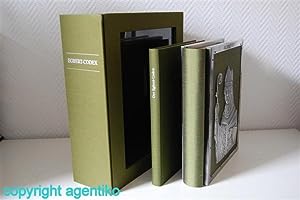codex (Más de 14.000 resultados)
ComentariosFiltros de búsqueda
Tipo de artículo
- Todos los tipos de productos
- Libros (14.743)
- Revistas y publicaciones (20)
- Cómics (7)
- Partituras (4)
- Arte, grabados y pósters (5)
- Fotografías (7)
- Mapas (No hay ningún otro resultado que coincida con este filtro.)
- Manuscritos y coleccionismo de papel (47)
Encuadernación
Más atributos
Idioma (38)
Gastos de envío gratis
Ubicación del vendedor
Valoración de los vendedores
-
Codex Caesareus Upsaliensis - An Echternach Gospel Book of the Eleventh Century - Facsimile edition with commentary
Publicado por Uppsala University, 79, 1971
Librería: Moraine Books, Ruovesi, Finlandia
EUR 4.062,80
Convertir monedaEUR 35,51 gastos de envío desde Finlandia a Estados Unidos de AmericaCantidad disponible: 1 disponibles
Añadir al carritoHardcover. Condición: Fine. Limited Edition. One of 500 copies. Two volumes.*** A facsimile edition of Codex Caesareus Upsaliensis, also known as "Evangeliary of Henry III -- The Emperor's Bible of Uppsala", one of the seven Gospel-books written in Echternach during the second and third quarter of the eleventh century. The Gospels were written in brownish-black ink, which sometimes shows considerable variation in hue. The initial letter of each sentence and the colophons were filled with gold or color, the smaller capitals inside the text columns and the rubrics were always written with gold. *** One of the characteristics which immediately catches the eye is its truly royal size of about 38 x 28 centimeters and hefty weight, being among the largest ever produced by the Ottonian School. The manuscript is in Uppsala University Library, this facsimile edition was published on the occasion of the university library's 350th anniversary.***Immaculate condition, both the facsimile copy and the commentary are well kept and crisp. Original slipcase has no dents. Commentary in English, facsimile's 159 folios in Latin.
-
Book of Kells: The Evangeliorum Quattuor Codex Cenannensis [3 Volume Set]
Publicado por Urs Graf-Verlag, Bern, 1950
EUR 3.881,65
Convertir monedaEUR 21,20 gastos de envío desde Reino Unido a Estados Unidos de AmericaCantidad disponible: 1 disponibles
Añadir al carritoHard Cover. Condición: Near Fine. Hardbacks, 3 volume set, 2 volumes boxed and one in a slipcase. Vol. 1&2 bound in vellum, front boards and spines decorated in gilt and black by Otto Walter Ltd, vol. 3 with vellum spine decorated in gilt and black, blue boards. Plain paper dust-wrappers for all 3 books, some tears. A limited edition of only 500 copies. The text volume includes an introduction by E. H. Alston, 'Notes on the Art and Ornament' by Peter Meyer, and a 'Collation of the Text with the Vulgate' by G.O. Simms. The boxes/slipcase are slightly marked and worn. Books themselves in excellent condition. A very heavy set, additional postage will be required for orders outside the UK.
-
Codex Seraphinianus (2 Volumes)
Publicado por Franco Maria Ricci, Milano, 1981
ISBN 10: 8821600262 ISBN 13: 9788821600265
Idioma: Latín
Librería: Book Merchant Jenkins, ANZAAB / ILAB, Woolloongabba, QLD, Australia
Original o primera edición Ejemplar firmado
EUR 3.837,27
Convertir monedaEUR 24,54 gastos de envío desde Australia a Estados Unidos de AmericaCantidad disponible: 1 disponibles
Añadir al carritoHardcover. Condición: Near Fine. First Edition. Signed by Author. 35cm x 24cm. 2 volumes, colour illustrations. Black cloth, gilt lettering, illustrated onlay, 2 clamshell folders, original shipping cartons. The first edition of the ever mysterious Codex Seraphinianus by Italian artist Luigi Serafini (1949-). Possibly an illustrated encyclopaedia of an alternate universe, Serafini has alluded that it is perhaps all just the thoughts of a cat passed through his hand. The Codex is written in an imaginary language and illustrated phantasmagorically throughout. This being the true first edition published in 2 volumes by Italian art publisher Franco Maria Ricci. This copy numbered 2295 and signed by Serafini to the colophon of volume 2, with the original trilingual letter from the editor laid in, together with a FMR catalogue, several photocopied Italian newspaper clippings related to the Codex, as well as the deluxe edition of the only published volume of literary criticism in English on the Codex Seraphinianus, Confronting Serafini by Jordan Hunter (2017), all housed in the original shipping cartons. Confronting Serafini is a 36 page book hand-bound with treated pages from the 2013 Rizzoli edition of the Codex, signed and numbered in a limited edition of 10, of which this is number 10. Very minor rubbing to corners of volume 2. Shipped Weight: 4.07 kilos. Signed by Author. ISBN: 8821600262. ISBN/EAN: 9788821600265.
-
P. Virgilii Maronis Bucolica Georgica et Aeneis / Ex Cod. Mediceo-Laurentiano descripta ab Antonio Ambrogi Florentino S.J.-- Tomus Primus (-- tertius) [FROM THE MEDICI'S VIRGIL CODEX IN THE LAURENTIAN, THIS TOP-END ZEMPEL SET WAS ONCE SHELVED AT THE ESCORIAL AND THE BRITISH MUSEUM OLD LIBRARY]
Publicado por Giovanni Zempel for Venanzio Monaldini, Rome, 1763, 1764, 1765, 1763
Librería: Arca Amoris Alitis, New York, NY, Estados Unidos de America
EUR 3.791,95
Convertir monedaEUR 9,12 gastos de envío en Estados Unidos de AmericaCantidad disponible: 1 disponibles
Añadir al carritoHardcover. Condición: Very Good. 3 volumes, grand fleur de lis quarto (overall 43.5 x 30 cm, pages 42 x 28.5 cm, except third volume 42.5 x 29.2 cm, pages 41.5 x 27.8 cm). Fine heavy large-margined laid paper, watermark fleur de lis within double circular rules (cf. Heawood 1592, citing Venuti, Antiqua Numismata, Rome, 1739). Original blanks, half-titles, titles printed in red and black with engraved medallion portraits, engraved dedications (to Carlo Emanuel III, King of Sardinia, by Carloni, to Vittorio Amedeo III, Duke of Savoy, by Barbazza after Van Loo and to Benedetto Maria Maurizio, Duke of Chablis, by Benedetti), tipped-in engraved leaf of script specimens from the source codices at start of Bucolica and tipped-in engraved map of the Mediterranean at start of Aeneis, altogether 174 finely engraved headpieces, in-text vignettes, tailpieces and illustrated initials throughout the text. Contemporary Roman dark brown mottled calf gilt, covers framed with floral roll, triple rules and houndstooth roll, cornering vases and scrolling flowers, spines with raised bands and seven compartments framed with rules and roll, second (on red morocco) and third with titling, others with flower and leaf tools, cover edges rolled, finely sprinkled rose endpapers, block edges stained carmine. Bindings gently rubbed and scuffed with a few abrasions and scratches, mild wear spine tips, slight gutter separations at openings, inscriptions on front endleaves, the finely printed text blocks overall notably bright and fresh, the set overall near fine saving the minor cover blemishes. Dibdin Classics II (4th ed. 1827), 558-9; Schweiger II (1834), 1177; Brunet V (1864), 1306; Graesse VI (2e partie) (1867), 343. Collation: v. I: [a]^6, b-k^4, l^6, A-Z^4, Aa-Bb^4, Cc^6, engraved leaf inserted before p. [1], free endleaf and blank leaf front and rear: [1 l.] (half-title), [1 l.] (title), [1 l.] (engraved dedication), pp. [iii]-v (dedication), [vi]-vii (adprobationes), viii (imprimaturs), ix-xxxvi (prefazione), xxxvii-xxxviii (indice), xxxix-lviii (dissertatio, Schmitz), lix-lxv (dissertazione, Pujati), lxvi-lxxiv (vita), lxxv-lxxxvi (historia, Ruæo), lxxxvii-lxxxviii (testimonia), [lxxxix-xc] (fly-title Bucolica), xci-xcii (argomenti), [1 l.] (inserted engraved leaf with scripts from codices), pp. [1]-60 (Bucolica), [61] (fly-title Georgica), 62 (argomenti), 63-202 (Georgica), 203-211 (indice), [212] (errata); 12 illustrated initials, 7 headpieces, 20 vignettes and 18 tailpieces; v. II: [a]^4, b-f^4, g^6, A-Z^4, Aa-Tt^4, engraved leaf inserted before p. [1], free endleaf and blank leaf front and rear: [1 l.] (half-title), [1 l.] (title), [1 l.] (engraved dedication), pp. [vii]-ix (dedication), (x), xi-xvi (prefazione), xvii-xviii (indice), xix-xlix (alphabetica descriptio), l (indice), li-lvi (dissertatio, Ambrogi), [lvii] (fly-title Aeneis), [lviii] (imprimaturs), lix-lx (argomenti), [1 l.] (inserted leaf with engraved map), pp. [1]-325 (Aeneis lib. I-VI), (326), 327-336 (indice); 9 illustrated initials, 8 headpieces, 34 vignettes and 10 tailpieces; v. III: [a]^4, b-c^4, A-Z^4, Aa-Rr^4, Ss-Tt^6, free endleaf and blank leaf front and rear: [1 l.] (half-title), [1 l.] (title), [1 l.] (engraved dedication), pp. [vii]-ix (dedication), (x), xi-xiv (prefazione), xv-xvi (indice), xvii-xx (dissertazione, Venuti), [xxi] (fly-title Aeneis lib. VII-XII), [xxii] (imprimaturs), xxiii-xxiv (argumenti), [1]-332 (Aeneis lib. VII-XII), 333-343 (indice), (344); 10 illustrated initials, 7 headpieces, 33 vignettes and 6 tailpieces. Provenance: La Real Biblioteca de El Escorial, Madrid (shelfmarks "Est. F. Plut. 1 N.9 [-.10, -.11]" in old gall ink on each front free endleaf verso); British Museum Old Library (shelfmarks "C.18.c.1" in old ink on each first blank recto in format applied by Anthony Panizzi, Principal Librarian, to books picked out and put in closed cases); [penciled notes of antiquarian bookseller, signed "R C," in Spanish on each front endleaf verso].
-
Dantes Göttliche Komödie mit Illustrationen von Sandro Botticelli. Prachtedition in großformatiger Schmuckkassette. Nebentitel / Alternativtitel: Dantes Divina commedia mit den Illustrationen von Sandro Botticelli. Codex Reg. Lat. 1896 / Codex Ham. 201 (Cim. 33).- Divine Comedy of Sandro Botticelli - Dante Alighieri's Divine Comedy - Divina Commedia con illustrazioni di Sandro Botticelli.
Publicado por Zürich: Belser c1986., 1986
Idioma: Alemán
Librería: Antiquariat BehnkeBuch, Neu Kaliß, Alemania
Miembro de asociación: GIAQ
EUR 3.784,00
Convertir monedaEUR 20,00 gastos de envío desde Alemania a Estados Unidos de AmericaCantidad disponible: 1 disponibles
Añadir al carritoDeckelbezug der Kassette im Gelenk leicht eingerissen, sonst nahezu perfekter Zustand. Ehemaliger Ausgabepreis 9.999 Euro - RG und Zertifikate anbei. G11-5 Sprache: Deutsch Gewicht in Gramm: 15000 Schmuckkassette 50*36 cm (leinenbezogen, Deckel lederbezogen). Reich goldgeprägter OLederband auf 7 falschen Bünden 48*36 cm, Kommentarband (von Peter Dreyer) OLeinenband 24*17 cm. Die Weltauflage beträgt 560 Exemplare wobei nur 500 Exemplare für den Verkauf bestimmt sind. Innerhalb der weltweiten Gesamtlimitierung ist eine Prachtedition in einer Auflage von 150 Exemplaren entstanden. Hier die Nummer 88 von 150 Exemplaren der Prachtedition.
-
Codex Caesareus Upsaliensis: An Echternach Gospel-Book of the Eleventh Century.
Publicado por Stockholm: Almqvist & Wiksell, 1971
Librería: Forest Books, ABA-ILAB, Grantham, LINCS, Reino Unido
Manuscrito
EUR 3.608,72
Convertir monedaEUR 14,72 gastos de envío desde Reino Unido a Estados Unidos de AmericaCantidad disponible: 1 disponibles
Añadir al carrito2 Vols., folio (377 x 279 mm), limited to 500 copies, commentary volume with text in English:164pp., illustrs., orig. vellum-backed cloth, covers slightly spotted, facsimile volume: 320pp., of coloured facsimiles, full vellum, endpapers slightly spotted, slip-case. The Emperor's Bible (Uppsala, UUB ms C 93; Swedish: kejsarbibeln), also known as Codex Caesareus, Codex Caesareus Upsaliensis or the Goslar Gospels,[1] is an 11th-century illuminated manuscript currently in Uppsala University Library, Sweden. Despite its name, it is not a Bible but a Gospel Book. The book was made in the scriptorium of Echternach Abbey, and is one of four preserved large Gospel Books made there during the 11th century. It was commissioned by Emperor Henry III and donated by him to Goslar Cathedral, where it remained until the Thirty Years' War. It was then lost for about 100 years. The book later appeared again in the possession of Swedish diplomat and civil servant Gustaf Celsing the Elder [sv]. At the death of his son, it was acquired by Uppsala University. The manuscript is richly decorated with miniatures, including full-page depictions of the Four Evangelists, illuminated canon tables and a depiction of the emperor donating the book to the patron saints of Goslar Cathedral. It is written in Carolingian minuscule and is overall well-preserved.
-
GEOGRAPHIAE CODEX VRBINAS GRAECVS 82
Publicado por E.J. Brill, Liden, 1932
Librería: Oak Knoll Books, ABAA, ILAB, NEW CASTLE, DE, Estados Unidos de America
EUR 3.521,10
Convertir monedaEUR 7,45 gastos de envío en Estados Unidos de AmericaCantidad disponible: 1 disponibles
Añadir al carritofolio, elephant folio. half leather, paper-covered boards; folio, half cloth with paper-covered boards. xvi, 605, (2); xii, (83); (vi), 37; (3), (157) plates; 4 volumes. Text in German, Latin, Greek. Four volume set of Ptolemy's Geography. Volume I is divided in three parts and is a detailed examination of Ptolemy as man, geographer, mapmaker, written in German by Josephi Fischer, with various indices, including names, geographers, subjects and a general index. Volume II has 57 photo reproductions of maps from Greek, Latin and Arabian makers depicting various early views of Europe, Asia and Africa. Volume III is an annotated list of the original texts with more than 150 photographic reproductions. Volume IV is the atlas in elephant folio with 27 map plates. All three volumes have bumping and wear to the corners and are heavily worn at bottom edges. The leather spines are rubbed and scratched. Folio has rubbing and soiling to the covers. Bottom cord tie is broken. half leather, paper-covered boards; folio, half cloth with paper-covered boards.
-
Faksimile - Das Hainricus-Sakramentar: Vollständige Faksimile-Ausgabe des Codex Ms. M 711 aus dem Besitz der Pierpont Morgan Library, New York. Faksimile u. Kommentarband.
Publicado por Graz, ADEVA, /2010, 2005
Idioma: Alemán
Librería: antiquariat peter petrej - Bibliopolium AG, Zürich, ZH, Suiza
EUR 3.506,78
Convertir monedaEUR 40,00 gastos de envío desde Suiza a Estados Unidos de AmericaCantidad disponible: 1 disponibles
Añadir al carritoFaksimile:Gr. 8°, 5 ganzseitige, mit Silber und punziertem Gold versehene Miniaturen, 2 ganzseitige ornamentierte Initialen, 24 Kalendermedaillons, 35 historisierte und 20 Tier- und Rankeninitialen; Kommentarbd. Gr.8°, 272 S., 58 Abb., Faks.: Brauner Ganzlederbd. blindgeprägt, 2 Schliessen in Holzkassette. Kommentarbd.: blauer OLwd-Bd., Tadell. Nr. 56 von 280 Exemplaren. Kommentar herausgegeben von Hans Ulrich Rudolf.- Um 1217 im Benediktienerstift Weingarten entstanden, durch den mit dem Notnamen Hainricus-Meister bezeichnet, einem Schüler des berühmten Berthold-Meisters. Die ganzseitigen Miniaturen, mit prächtigen Rahmen wie Tafelbilder ausgeführt, bestechen vor allem durch ihre beeindruckende Monumentalität. Die Initialen beschreiben in lebendigster Weise biblische Episoden; die Gestalten brechen immer wieder aus den Buchstaben aus und steigern so die unglaubliche Dynamik der Miniaturen. Groteske Tiere und Fabelwesen bevölkern den Buchschmuck, kunstvoll verschlungene Ranken und präzise Fleuronnées begeistern den Betrachter. Das Hainricus-Sakramentar umfasst nicht nur all jene Texte, die während eines Gottesdienstes, der Erteilung von Sakramenten und Weihen gesprochen werden es, enthält auch gesungene Messtexte, versehen mit Neumen und ist somit auch ein Missale oder auch ein Graduale. 3300 gr. Schlagworte: Handschriften - Faksimile, Buchwesen - Kalligraphie, Geschichte - Mittelalter, Religion - katholisch.
-
La sacra bibbia - Codice vaticano greco 1209 cod. b. - Codex Vaticanus Graecus
Publicado por Città del Vaticano, 1965
Librería: Libreria Utopia Pratica, Torino, TO, Italia
Original o primera edición
EUR 3.500,00
Convertir monedaEUR 25,00 gastos de envío desde Italia a Estados Unidos de AmericaCantidad disponible: 1 disponibles
Añadir al carritoRilegato. Condición: ottimo. sovraccoperta. prima edizione. ΤΠΠΠΡΠΠΠΠΠΠΠ- COD. B. N. T. CODEX VATICANUS GRAECUS 1209 (CODEX B) PHOTOTYPICE EXPRESSUS IUSSU PAULI PP VI PONTIFICIS MAXIMI H KAINHE Î"IAÎ HKH La Sacra Bibbia - Codice Vaticano Greco 1209 (Codice B) Riproduzione in facsimile per ordine di sua Santità Paolo VI Nuovo Testamento The Holy Bible - Vatican Codex Greek 1209 (Code B) Reproduction in facsimile by order of Pope Paul VI New Testament Rara edizione in facsimile del Corpus Vaticanus Graecus 1209 (codex b) stampata dalla Città del Vaticano nel 1965. Volume in ottimo stato, minimi difetti alla sovracoperta, leggera rigatura della stessa all'altezza della cerniera. Piccolo difetto alla cerniera del piatto anteriore, come visibile in foto. Allegato un fascicolo di 21 pagine di presentazione dell'edizione. Edizione fuori commercio di non specificati esemplari, la presente copia à stata donata dalla Segreteria di Stato di Sua Santità al Prof. Giovanni Pugliese Carratelli, come dimostra il foglio allegato al volume (visibile in foto) datato 31 marzo 1966. Rare facsimile edition of the Corpus Vaticanus Graecus 1209 (codex b) printed by the Vatican City in 1965. Volume in excellent condition, minimal defects are visible in photo. Small defect in the hinge of the front plate, as shown in the picture. This edition include a presentationâ s dossier of 21 pages. Edition out of trade of unspecified exemplars, this copy was donated by the Secretariat of State of Pope Paolo VI to Prof. Giovanni Pugliese Carratelli, as evidenced by the sheet attached to the volume (visible in photo) dated March 31, 1966 Non esitate a contattarci per altre foto o richieste. Saremo lieti di soddisfare ogni vostra esigenza. Libri.
-
Codice Hammer (Codex Hammer)
Publicado por Giunti, Barbèra, Firenze, 1987
Librería: Seprian, Villastellone, TO, Italia
EUR 3.450,00
Convertir monedaEUR 48,00 gastos de envío desde Italia a Estados Unidos de AmericaCantidad disponible: 1 disponibles
Añadir al carritoRilegato. Condición: Ottime. leonardo da Vinci Ilustrador. Limitata. Codice Hammer (Codex Hammer). Seattle, WA, Bill Gates Collection. Giunti, Barbèra, Firenze, 1987. Cofanetto con all'interno il facsimile del codice, il facsimile di un foglio di studi di figura (Hammer20) e un volume di testo, in inglese, di (LX) 222 pagine a cura di Carlo Pedretti. Legatura in pelle con impressioni in oro sul dorso. Tiratura limitata a 998 esemplari, numerati a mano. Condizione ottima. 5000g.
-
FLATEYJARBOK (CODEX FLATEYENSIS). Ms.
Librería: Herman H. J. Lynge & Søn ILAB-ABF, Copenhagen, Dinamarca
EUR 3.449,48
Convertir monedaGratis gastos de envío desde Dinamarca a Estados Unidos de AmericaCantidad disponible: 1 disponibles
Añadir al carritoCopenhagen, 1930. No.1005 fol.in the royal collection in the Royal Library of Copenhagen. With an Introduction by Finnur Jonsson. . Folio. Orig.hvellum. (14) pp. and 448 pp. of facsimiles(photolithographs by Emil Pinkau & Co.,A-G, Leipzig). Corpus Codicum Islandicorum Medii Aevi,vol.I. - The work contains in full size reproduction this world-famous manuscript.
-
EUR 3.300,00
Convertir monedaEUR 16,95 gastos de envío desde Francia a Estados Unidos de AmericaCantidad disponible: 1 disponibles
Añadir al carritoReliure d'éditeur. Très beau fac similé du nouveau testament inscrit à bibliothèque du Vatican à la cote VAT. LAT. 39. C'est une copie de la traduction de Saint-Jérome du nouveau testament datant du 13° siècle. Elle est très richement enluminée et réputée pour la qualité dramatique des illustrations décrivant la vie du Christ. Environ 100 illustrations accompagnent le texte. Boite toilée marron avec pièce de titre sur le premier plat, petit volume de commentaires pleine toile marron, 119 pages en allemand, par Giovanni Morello et Ulrich Stockmann, tirage à 600 exemplaires, dont 50 ont été réservé au Pape Jean Paul II. Le fac-similé fait 348 pages, mesure 15 cm * 22 cm, il porte le numéro 520. L'ouvrage est relié d'une plein peau estampée à froid. Bel exemplaire dans sa boite d'origine. Petit tirage. Livraison a domicile (La Poste) ou en Mondial Relay sur simple demande.
-
Faksimile - Das Evangeliar Heinrichs des Löwen. Vollfaksimile des Codex Guelf. Noviss. 2° der Herzog August Bibliothek in Wolfenbüttel.
Publicado por Frankfurt, Insel, -89, 1988
Idioma: Alemán
Librería: antiquariat peter petrej - Bibliopolium AG, Zürich, ZH, Suiza
EUR 3.264,93
Convertir monedaEUR 40,00 gastos de envío desde Suiza a Estados Unidos de AmericaCantidad disponible: 1 disponibles
Añadir al carritoFaksimile: 4° (35 x 27 cm), 225 Bl. mit 50 ganzs. farbigen Miniaturen davon 17 Kanontafeln, 4 Evangelistenbilder, 9 Zierseiten, 77 größere und 7 große, reich verzierte Initialen; Kommentarbd.: 4°, 335 S., 145 s/w-Abb., 16 farb. Taf., Faksimile: Braunes Leder, blind- u. goldgeprägt mit 3 echten Bünden: Kommentarbd: OLdr. goldgeprägt, beides in OLwd- Schuber, Tadell. Nr. 766 von 1000 num. Exemplaren- Sonderbindung für Bibliotheca Rara aus dem Originalbestand nicht aufgebundener Exempalre.- Das Evangeliar Heinrichs des Löwen ist die kostbarste Handschrift des deutschen 12. Jahrhunderts. Es ist gleichzeitig ein bedeutendes Monument der weltlichen wie geistlichen Geschichte Deutschlands. Unter den Bilderhandschriften gebührt dem Evangeliar ein besonderer Rang, durch die Kostbarkeit seiner Ausstattung, den Reichtum und die Vielfalt seines bildlichen und ornamentalen Schmuckes. Heinrich der Löwe selbst hat diese Handschrift anfertigen lassen und sie, gemeinsam mit seiner Gemahlin Mathilde, der von ihm neu errichteten Stiftskirche St. Blasius in Braunschweig gewidmet. - Seit der über fünfzig Jahre zurückliegenden Dissertation von Franz Jansen zur Helmarshausener Buchmalerei stellt dieser Kommentarband hrsg. von Dietrich Kötzsche, die erste ausführliche wissenschaftliche Veröffentlichung zum Evangeliar Heinrichs des Löwen dar. 6000 gr. Schlagworte: Alte Drucke - Faksimile, Religion - katholisch, Geschichte - Mittelalter, Handschriften - Faksimile.
-
Codex Seraphinianus
Publicado por Franco Maria Ricci, Milan, 1981
Librería: Karol Krysik Books ABAC/ILAB, IOBA, PBFA, Toronto, ON, Canada
Ejemplar firmado
EUR 3.263,60
Convertir monedaEUR 15,78 gastos de envío desde Canada a Estados Unidos de AmericaCantidad disponible: 1 disponibles
Añadir al carritoHardcover. Condición: Near Fine. Luigi Seraphini Ilustrador. Limited First Edition. Folio (360 x 235mm). (1981). Two volumes in separate cases. Black cloth, gilt, with pictures pasted down and very lightly rubbed corners. Limited first edition (#1268), signed by the author, Luigi Serafini on the limitation page at the rear of the second volume. The editor signed also on a laid-in sheet. The boxes a little sunned at the spine, but overall a very near fine set. The Codex is meant to be unreadable.
-
[Codex Argenteus]: D. N. Jesu Christi SS. Evangelia Ab Ulfila Gothorum in Moesia Episcopo Circa Annum a Nato Christo Cclx. Ex Graeco Gothice Translata, Nunc Cum Parallelis Versionibus, Sveo-Gothica, Norraena, Seu Islandica, & Vulgata Latina Edita Glossarium Ulphila-Gothicum, Linguis Affinibus, Per Fr. Junium ; Nunc Etiam Sveo-Gothica Auctum & Illustratum Per G. Stiernhielm.
Publicado por Nicolaus Wankif, Stockholm, 1671
Librería: Leaf and Stone Books, Toronto, ON, Canada
Original o primera edición
EUR 3.223,16
Convertir monedaEUR 6,57 gastos de envío desde Canada a Estados Unidos de AmericaCantidad disponible: 1 disponibles
Añadir al carritoLeather. Condición: Very Good. Estado de la sobrecubierta: No Dust Jacket. First Edition; Second Printing. [xxxxiv], 703; [ii], [iv] 152. Three folding plates in the first section, showing the descendants of Shem, Ham and Japheth. 1 folding plate in the glossary. Engraved frontis. Octavo. Full probably contemporary calf leather binding, rubbed at the corners, 4 raised bands to the spine with stamping in the compartments, gilt nearly gone. Interior front end paper has old bibliographic clip laid down with pencil German notes under, some various old brown ink small notes here and there, the name Chas. Lillie Stockh 1746 on verso of the title. Occasional errors of pagination, the paper stock is a bit eccentric with the paper fading out at the occasional corner or fore-edge, a few small thin spots in the margins, one affecting text. Text otherwise clean, endpapers edge-darkened, inside back cover has collation notes dated 1978. The title page for the Glossarium has the date 1671, making this the 2nd issue of the first Swedish edition of the Gothic translation of the Gospels, which are in Gothic (in Roman type) , Icelandic and Swedish (both in Black Letter) and in Latin (Italic). The preface in Latin, by Swedish scholar Georg Stjernhejelm, includes a dissertation on the origins of languages and finishes with the Lord's Prayer, first in Latin (the "mother tongue") , then translations in Italian, Spanish, French, Romansh, Sardinian and Sardinian Vulgata, and Romanian (Walachian) -- the first Romanian text published in Western Europe (Museum of Biblical Art). Ulfilas (Wulfila) was a 4th century Greek who is said to have been kidnapped by the Goths. He converted them to Christianity and eventually became their bishop. He is purported to have developed a new alphabet in order to translate the Bible into Gothic for the first time (although analysis of surviving texts indicates that the translation was probably a group effort). His Bible was also the earliest known literary text in a Germanic language and the oldest surviving Teutonic text. Only fragments of Ufilas's Bible survive, mostly NT, dating from the 5th or 6th century. Those fragments were written with silver ink (hence Codex Argenteus) on purple parchment and given to Theodoric the Great (454-526) , king of the Ostrogoths. The manuscript traveled to Prague, to Holland, to France -- where Francois Jun (Junius) studied it and published the first modern edition in 1665. Finally the Codex Argenteus went to Sweden, where this important edition was put together by Stjernhjelm. The elaborate frontispiece, drawn by Swedish artist David Klöcker Ehrenstrahl (1628-98) and engraved by Dionysius Padtbrugge (1628-83) , is a copy of the scene on the original Codex Arg. , and shows Ulfilas writing at a table, while Father Time dramatically lifts a gravestone releasing Naked Truth who emerges with a copy of the Codex Argenteus. This copy of this important work is especially interesting because the separate title page for Junius's Glossarium is dated 1671 and it includes a folding plate we have not been able to locate on any other copy. Opposite the page showing the 3 columns with the Gothic, the Runic and the Latin alphabets is an unrecorded? Page titled Oratio Dominica quoting Matthew 6: 9. The verse is written in Gothic lettering with a romanized pronunciation guide underneath each word, along with fragments from a few other Bible verses, similarly done in Gothic with pronunciation help. This extraordinary page is followed by another Glossarium title page dated 1670. An important and fascinating linguistic and religious work, in nice condition, with a possibly unknown folding plate. OCLC 54320847 (which does not have the Glossarium plate) ; 8vo 8" - 9" tall; 855 pages.
-
Das Tierbuch Des Petrus Candidus Codex Urbinus Latinus 276. Geschrieben 1460, Illuminiert im 16. Jahrhundert. Faksimilie der Handschrift von 1460.
Publicado por Zürich, Belser Verlag., 1984
Librería: Biblion Antiquariat, Zürich, ZH, Suiza
EUR 3.200,00
Convertir monedaEUR 25,00 gastos de envío desde Suiza a Estados Unidos de AmericaCantidad disponible: 1 disponibles
Añadir al carrito2 Bde. (Faksimile u. Kommentar- bzw. Einführung-Bd.). 27,5x29 cm. III, 232, (2) Bl. mit 469 kolorierten Tierdarstellungen; 213 S. mit 31 teils ganzseitigen Abbildungen. Roter Ldr.-Bd. mit Rückenvergoldung, goldgepr. mehrfacher floraler Deckelfiletierung mit Ecklfeurons und Ganzgoldschnitt; grüner OLn.-Bd. mit goldgepr. Rückentitel. In grüner OLn.-Kassette (37x26 cm) mit goldgepr. Rückentitel und montiertem Deckelschild mit Schliessband. Nr. 47 von 600 hs. numerierten Exemplaren für den deutschsprachigen Raum (GA 2460 Ex.). - Der Text des Einführungsbandes ist von Cynthia M. Pyle. - Wundervolles und prächtig ausgestattetes Faksimile eines der wertvollsten zoologischen Manuskripte aus der Biblioteca Apostolica Vaticana. - Sehr gutes, verlagsfrisches Exemplar.
-
Codex medicamentarius, seu pharmacopoea Parisiensis, ex mandato facultatis medicinae Parisiensis in lucem edita, M. Joanne-Baptista-Thoma Martinenq, decano. Editio auctior et emendatior.
Publicado por Paris, apud Guillelmum Cavelier, 1748., 1748
Librería: Bernard Quaritch Ltd ABA ILAB, London, Reino Unido
Original o primera edición
EUR 3.032,54
Convertir monedaEUR 29,44 gastos de envío desde Reino Unido a Estados Unidos de AmericaCantidad disponible: 1 disponibles
Añadir al carritoFirst Edition. 4to, pp. [16], cxxxii, 268, xxxiv, [6]; engraved initials, head- and tail-pieces; marginal damp stain to first few leaves; very good in contemporary mottled calf, spine gilt in compartments with lettering-piece, red edges, marbled endpapers; upper joint split but firm, some wear to corners, a few abrasions and marks to boards; extensive near contemporary marginal ink annotations in French to pp. 19-186.Revised and enlarged edition (first 1638) of the Parisian pharmacopoeia, edited by the dean of the faculty of medicine at the University of Paris, Jean Baptiste Thomas Martinenq (d. 1758), this copy greatly enhanced by extensive critical and analytical marginalia by an experienced near contemporary medical practitioner. Following a thorough index of medicinal ingredients, the body of the text provides recipes for, inter alia, simples, potions, vinegars, syrups, powders, electuaries, tablets and pills, oils, plasters, distillations and spirits, and salts. Lists of doctors at the faculty of medicine and of Parisian pharmacists are also provided. The marginal annotations in this copy add great value to the bare bones of the recipes by providing a rare insight into eighteenth-century usage of such pharmacopoeia. The unnamed annotator was clearly an experienced pharmacist: his notes are based on his own, evidently considerable practice and were perhaps intended for teaching purposes. He recommends the inclusion or exclusion of ingredients and discusses their virtues, proposes adjustments to the recommended measures and doses, gives revised methods of composition, and notes the medical uses to which recipes should be put. The annotator praises some recipes (e.g. 'la formule est bien'; 'ce beaume est très bien dosé'; 'si vous avez bien suivi ce procedé votre syrop gardé a la cave sera bon au bout de 20 ans') but is critical of several others. He objects to the use of stag horn and human skull in pulvis antispasmodicus, dismisses the use of pearls in another powder as expensive and ineffectual, and describes the recipe for theriac as a 'hochepot monstrueux'. His outlook is not confined to France: his note on theriaca coelestis remarks that 'elle a produit de grands effets au missisipi'; he refers to German and English practice regarding mercury pills; and he warns against Morton's pills, stating that 'les ouvrages de Morton sont une lecture dangereuse'. The notes contain several mentions of 'Mr Rouelle', presumably the chemist and apothecary Guillaume-François Rouelle (17031770), whose pupils included Diderot, Lavoisier, and Parmentier. Wellcome IV, p. 368. Language: French.
-
EUR 3.000,00
Convertir monedaEUR 30,00 gastos de envío desde España a Estados Unidos de AmericaCantidad disponible: 1 disponibles
Añadir al carritoEncuadernación de tapa dura. Condición: Nuevo. Estado de la sobrecubierta: Nuevo. El Codex es una enciclopedia manuscrita con abundantes ilustraciones a lápiz de colores, dibujadas a mano, de flora , fauna , anatomías, modas y alimentos extraños y fantásticos . Se ha comparado con el manuscrito Voynich aún sin descifrar , la historia " Tlön, Uqbar, Orbis Tertius " de Jorge Luis Borges , y la obra de arte de MC Escher y Hieronymus Bosch . Las ilustraciones son a menudo parodias surrealistas de cosas del mundo real, como una fruta sangrante, una planta que crece aproximadamente en la forma de una silla y luego se convierte en una, y una pareja copulando que se metamorfosea en un caimán . Otros representan máquinas extrañas, aparentemente sin sentido, a menudo con apariencias delicadas y unidas por pequeños filamentos. Algunas ilustraciones son reconocibles como mapas o rostros humanos; mientras que otros (especialmente en el capítulo de "física") son mayoritariamente o totalmente abstractos. Casi todas las ilustraciones son de colores brillantes y muy detalladas. El sistema de escritura falsa parece inspirado en los sistemas de escritura occidentales, con escritura de izquierda a derecha en filas y un alfabeto con letras mayúsculas y minúsculas , algunas de las cuales se duplican como números. Algunas letras aparecen solo al principio o al final de las palabras, similar a los sistemas de escritura semíticos . Las letras curvilíneas tienen forma de cuerda o hilo, con lazos e incluso nudos, y recuerdan un poco a la escritura cingalés . En una charla en la Sociedad de Bibliófilos de la Universidad de Oxford el 11 de mayo de 2009, Serafini afirmó que no hay ningún significado detrás de la escritura del Codex , que es asémica ; que su experiencia al escribir fue similar a la escritura automática ; y que lo que quería que transmitiera su alfabeto era la sensación que sienten los niños con los libros que aún no pueden entender, aunque ven que la escritura tiene sentido para los adultos. Sin embargo, el sistema de numeración de páginas del libro fue decodificado por Allan C. Wechsler y el lingüista búlgaro Ivan Derzhanski, y es una variación de la base 21 . El libro consta de once capítulos, en dos secciones. La primera sección parece describir el mundo natural de la flora, la fauna y la física. El segundo trata de varios aspectos de la vida humana, incluidas las prendas, la historia, la cocina y la arquitectura. Cada capítulo parece abordar un tema enciclopédico general, como sigue: Tipos de flora: flores extrañas, árboles que se arrancan y migran, etc. Fauna (animales), incluidas variaciones surrealistas del caballo , hipopótamo , rinoceronte y aves Un reino aparentemente separado de extrañas criaturas bípedas. Física y química (generalmente considerado el capítulo más abstracto y enigmático) Máquinas y vehículos extraños Las humanidades: biología, sexualidad, pueblos aborígenes , incluidos algunos ejemplos con plantas y herramientas (por ejemplo, bolígrafos, llaves inglesas) injertadas en el cuerpo humano. Historia: personas (algunas sólo vagamente humanas) de significado desconocido, con sus tiempos de nacimiento y muerte; escenas de importancia histórica y posiblemente religiosa; costumbres funerarias y funerarias La historia del sistema de escritura del Codex Alimentos, prácticas gastronómicas, prendas Juegos extraños, como cartas, juegos de mesa y deportes atléticos. Arquitectura Después del último capítulo hay una tabla de contenido o índice, seguido de un epílogo aparente cuya escritura se presenta de manera más informal. Dos láminas del sexto capítulo contienen líneas de texto francés, una cita de " A la recherche du temps perdu: Albertine disparue " de Marcel Proust ( En busca del tiempo perdido: Albertine Gone ). Las palabras esparcidas por el suelo de la ilustración son del mismo libro.
-
[Codex Iustiniani]. Digestum vetus [-Infortiatum, -Digestum novum, -Institutionum, -Volumen locupletius, -Codicis.]. Commentarijs Accursij et clarissimorum iurisconsultorum scholijs [.].
Publicado por Augustae Taurinorum, apud haeredes Nicolai Bevilaquae, 1576
Librería: Gabriele Maspero Libri Antichi, Como, Italia
EUR 3.000,00
Convertir monedaEUR 45,00 gastos de envío desde Italia a Estados Unidos de AmericaCantidad disponible: 1 disponibles
Añadir al carritoCondición: Molto buono. 6 volumi in 5 tomi in-folio (cm. 42,5) con legature coeve in mezza pelle nocciola e angoli con fregi e filetti a secco, frammenti di antica etichetta con titolo manoscritto ai dorsi, piatti ricavati da un codice notarile (alcuni restauri a due dorsi); pp. [20] coll. 1838 pp. [61], pp. [12] coll. 1856 pp.38, pp. [16] coll. 1742 pp. 41, cc. [6] coll. 556 cc [9], cc. [10] 272 coll. 1184 cc. [6] in ottimo stato, testo su due colonne in rosso e nero, frontespizi con grande vignetta tipografica (toro), iniziali silografiche, alcune silografie n.t. anche grandi; leggere bruniture e sporadiche fioriture, qualche nota coeva e macchie marginali ai frontespizi. Imponente edizione del codice giustinianeo. Cfr. Bersano Begey, Le cinquecentine piemontesi, I, p. 156 n. 196. Esemplare molto buono e genuino. (SC3).
-
Das Fürst-Bischöfliche Evangelistar. Faksimile des Codex ms. Ac. e Doni 156 der Biblioteca Medicea Laurenziana in Florenz.
Año de publicación: 2021
Librería: Ketterer Kunst Hamburg GmbH, Hamburg, Alemania
EUR 3.000,00
Convertir monedaEUR 60,00 gastos de envío desde Alemania a Estados Unidos de AmericaCantidad disponible: 1 disponibles
Añadir al carritoHardcover. Condición: Gut. Rimini, Imago 2021. - Faksimile des 1507 von dem Fürst-Bischof zu Würzburg, Lorenz von Bibra (1459 1519), in Auftrag gegebenen glanzvollen Evangelistar. 1 von 399 num. Exemplaren. Mit dem Begleitband. - EINBAND: Goldgeprägter Orig.-Lederband über Holzdeckeln mit einem gefaßten Katzenauge auf dem vord. Deckel und Ganzgoldschnitt, in mit Velourleder gefütterter Holzkassette mit numerierter Platte auf dem oberen Deckel. 25 : 24 cm. - Facsimile of the magnificent evangelist commissioned in 1507 by the Prince-Bishop of Würzburg, Lorenz von Bibra (1459 1519). 1 of 399 numb. copies. Gilt orig. calf over wooden boards with a cat's eye on the front cover, gilt edges, together with commentary in a wooden case lined with suede leather with a numbered plate on the upper cover. 25 :24 cm.
-
Codex Manesse. Die grosse Heidelberger Liederhandschrift. Faksimile-Druck des Codex Palatinus Germanicus 848 der Universitätsbibliothek Heidelberg. Erschien zum 75jährigen Bestehen des Inselverlages.
Publicado por Insel Verlag, Frankfurt, 1974 bis, 1978
Idioma: Alemán
Librería: Antiquariat im Schloss, Schwaigern, D, Alemania
Ejemplar firmado
EUR 2.999,00
Convertir monedaEUR 35,00 gastos de envío desde Alemania a Estados Unidos de AmericaCantidad disponible: 1 disponibles
Añadir al carritoFol. , Hardcover/Pappeinband. 12 Lieferungen in Einzelblättern (einzige Ausgabe dieser Art) mit jeweiligem Begleitheft in hellgrünen Orig.-Pappkassetten mit Deckelschildchen. Von sehr guter Erhaltung, die Faksimiles z.T. noch in den transparenten Orig.-Verpackungen. Die Lieferungskassetten gering bestossen, drei kleine Braunfleckchen. Die Manessische Liederhandschrift ist eine der schönsten und kostbarsten Handschriften des Mittelalters. Diese Gesamtausgabe des deutschen Minnesangs ab 1160 enthält etwa 6000 Strophen meist weltlicher Lyrik von 140 Dichtern. Sprache: Deutsch Gewicht in Gramm: 10500 Vollfaksimile. Erschienen in einer Auflage von 750 numerierten Exemplaren. Dies ist die Nummer 370.
-
Codex Physiologicus, quem Ad usus domesticos, ac in favorem Auditorum suorum edidit.
Publicado por Vesontione (Besançon), Ex Typographiâ Joannis-Felicis Charmet, 1776., 1776
Librería: Librería Comellas, Barcelona, España
Original o primera edición
EUR 2.900,00
Convertir monedaEUR 35,00 gastos de envío desde España a Estados Unidos de AmericaCantidad disponible: 1 disponibles
Añadir al carritoin-8. 3ff. 246pp. 2ff. Plein veau moucheté, dos lisse orné (reliure de l'époque). Edition Originale du deuxième ouvrage de Nicolas-François Rougnon (1727-799). Professeur de médecine à l'université de Besançon, il est considéré par divers historiens de la médecine comme le premier découvreur des symptômes de l'infarctus dans la légendaire "Lettre à M. Lorry , touchant les causes de la mort de feu Monsieur Charles , ancien capitaine de cavalerie" (Besançon, 1768). Ce petit opuscule de cinquante-cinq pages, précédant la description classique de l'angine de poitrine par Heberden, figure parmi plus grandes raretés de la littérature ancienne de cardiologie (cf. Garrison-Morton). Egalement imprimé à Besançon, le présent ouvrage consacré à la physiologie générale contient plusieurs chapitres dédiés à la circulation du sang et à la fonction cardiaque: "De Sanguinis Circulatione", "De Causis Circulatione Sanguinis", "De actione Cordis", "De Circulationis Legibus", et "De usibus Circulationis Sanguinis". Il est également très rare. Bel exemplaire finement relié à l'époque. Worldcat ne décrit que 5 exemplaires dans les collections à travers le monde, dont un seul localisé hors du territoire français (New York Academy of Medicine).
-
Ptolemaeus, Claudius: Cosmographia. Faksimile der Handschrift Codex Urbinas Latinus 277 aus der Bibliotheca Apostolica Vaticana, Rom. Kommentar hrsg. v. A. Dürst.
Publicado por Zürich, Belser 1982 - 83., 1982
EUR 2.800,00
Convertir monedaEUR 20,00 gastos de envío desde Alemania a Estados Unidos de AmericaCantidad disponible: 1 disponibles
Añadir al carrito2 Bände (Faksimile- und Kommentarband). Gr.-Folio bzw. 4°. 135 Blatt mit 44 Karten., 88 S. Old. mit Messingbeschlägen bzw. Oln. Exemplar der Vorzugsausgabe mit Holzschmuckkassette, die als Stehpult aufgebaut werden kann. 1 von 550 Ex.Kommentarband leicht bestoßen.
-
Das Weinachtsmissale Alexanders VI. Codex Borgiano lat. 425 der Biblioteca Apostolica Vaticana
Publicado por Belser Verlag, 1986
EUR 2.750,00
Convertir monedaEUR 16,95 gastos de envío desde Francia a Estados Unidos de AmericaCantidad disponible: 1 disponibles
Añadir al carritoRelié. In-folio (33,7 x 47,5 cm), reliure pleine peau, dos à nerfs, fermoirs en laiton, fers dorés et filets estampés à froid aux plats, exemplaire numéroté (ici le numéro 104), fac-similé du Missel de Noël d'Alexandre VI, Borg. lat. 425, l'un des plus importants manuscrits liturgiques réalisés au XVe siècle en l'honneur du pape Alexandre VI, reproduction rehaussées à l'or ; quelques incidents et frottements aux plats, bord supérieur du premier plat un peu décoloré suite à une mouillure, traces d'humidité sur les deux premiers feuillets, deux épidermures papier sur les deux derniers feuillets où les pages ont adhéré entre elles, par ailleurs bon état général. Livraison a domicile (La Poste) ou en Mondial Relay sur simple demande.
-
Der Trojanische Krieg. Codex 2773 der Österreichischen Nationalbibliothek, Wien. 2 Bände [Faksimile- und Kommentarband, komplett]
Publicado por Berlin, Coron-Verlag, 2007
Idioma: Alemán
Librería: Antiquariat Lenzen, Düsseldorf, Alemania
EUR 2.720,00
Convertir monedaEUR 78,00 gastos de envío desde Alemania a Estados Unidos de AmericaCantidad disponible: 1 disponibles
Añadir al carritoFaksimile: 27,5 x 37 cm. Kassette: 239 Blatt; 184 Seiten. Faksimile: Roter Original-Lederband auf 5 Bünden mit Streicheisenlinien, goldgeprägten Wirbelrosetten, Farbprägungen und verzierten Messingschließen. Kommentar: Original-Kunstseidenband mit montierter farbiger Deckelillustration und illustrierten Vorsätzen. Beides in Original-Lederkassette mit Acrylglasabdeckung. Nummer 138 von 998 Exemplaren. Faksimile mit rot rubriziertem Text, farbigen Lombarden, Paragraphzeichen, Deckfarbeninitialen und 334 farbigen und goldgehöhten Miniaturen (zum Teil ganzseitig). Kommentarband mit zahlreichen schwarz-weißen Textabbildungen. Da der Originaleinband des Codex 2773 verlorengegangen ist, diente hier als Vorlage der Einband einer anderen spätmittelalterlichen Handschrift aus dem Besitz der Österreichischen Nationalbibliothek, einer um 1481 gefertigten Kalenderhandschrift aus der Werkstatt des Salzburger Buchkünstlers Ulrich Schreier. Die durch den Codex 2773 überlieferte deutsche Version von Guidos Historia destructionis Troiae, die zwischen 1430 und 1460 in Regensburg entstand, scheint eigens für dieses bestimmte Exemplar angefertigt worden zu sein. Die Miniaturen gehen zurück auf einen meisterhaften deutschen Buchmaler Martinus, der das Werk, ungewöhnlich für die Zeit, als seines namentlich kenntlich gemacht hat. Kassette und Faksimileband kaum merklich minimal berieben, ansonsten tadelloses Exemplar.
-
The Gnostic Gospels: The Sacred Writings of the Nag Hammadi Library, The Berlin Gnostic Codex, and Codex Tchcas
Librería: Bulk Book Warehouse, Rotterdam, NY, Estados Unidos de America
EUR 2.702,35
Convertir monedaGratis gastos de envío en Estados Unidos de AmericaCantidad disponible: 1 disponibles
Añadir al carritoCondición: Good. Shows minimal wear such as frayed or folded edges, minor rips and tears, and/or slightly worn binding. May have stickers and/or contain inscription on title page. No observed missing pages.
-
Egbert Codex * Faksimile Verlag Luzern * Egberti * Bibel * BESTZUSTAND * WIE NEU
Publicado por Faksimile Verlag, 2005
Librería: agentiko - Antiquariat & Galerie, Erfurt, Alemania
EUR 2.690,00
Convertir monedaEUR 105,00 gastos de envío desde Alemania a Estados Unidos de AmericaCantidad disponible: 1 disponibles
Añadir al carritoHardcover. Condición: Wie neu. Hier verkaufen wir das Faksimile des Egbert-Codex - dem ältesten Bilderzyklus zum Leben Jesu. Herausgeber war: Faksimile Verlag Luzern. Gedruckt wurde es im Jahr 2005 - limitierte Auflage von nur 980 Stücken! Heute wird die Handschrift als HS 24 in der Stadtbibliothek in Trier aufbewahrt. Lieferumfang: 2 Bände: Faksimile + Kommentarband Schmuckschatulle Zustand: stammt aus sehr gepflegtem Nichtraucherhaushalt zu 100% ungelesenes Stück - als Wertanlage erworben NEUZUSTAND beide Bände in orig. schützender Schmuckschatulle perfektes Exemplar Schatulle ebenfalls im Bestzustand im Shop Verwendung von Bsp.-fotos eines bereits verkauften Exemplars Details: bis ins Detail dem Original aus dem 10. Jahrhundert nachempfunden alle Seiten im Originalformat von ca. 27,0 x 21,0 cm 330 Seiten, dem Original entsprechend, randbeschnitten 60 reich illuminierte Seiten über 240 kunstvoll ausgeschmückte Initialen typischer ottonischer Bucheinband aus grüner Seide vordere Buchdeckel ziert eine fein gearbeitete, versilberte und patinierte Metallplatte, dessen Vorbild eine Darstellung Egberts auf dem Mettlacher Kreuzreliquiar liefert: sein einzig erhaltenes Porträt auf einer Metallplatte streng limitiert auf 980 Exemplare Exemplar trägt Nr. 159/980 beim Verlag vergriffen Als Höhepunkt der Ottonischen Buchmalerei wurde der Egbert-Codex von der UNESCO zum "Memory of the World" erhoben. Die für Erzbischof Egbert von Trier um das Jahr 990 im Skriptorium des Klosters Reichenau angefertigte Handschrift stellt als Perikopenbuch bzw. Evangelistar auf 165 Blättern die Lesungen aus den vier Evangelien im Ablauf des Kirchenjahrs dar. Jede Perikope beginnt mit einer großen I-Initiale, die mit einem Flechtband aus Gold und Silber gefüllt ist Erwerben Sie hier eine wahre Rarität zu einem absoluten top Preis. Das Buch wurde als Renditeobjekt erworben! Besichtigung möglich Selbstabholung jederzeit möglich, innerhalb 3 Tagen nach Kauf.
-
Codex-Trocortesianus - Codice Trocortesiano - Like-new facsimile edition - Pre-Columbian Art & Culture - Mexica Mexican Art - Maya Art
Publicado por T estimonio Compañia Editorial, 1991
Librería: Sherrington's Facsimiles, Houston, TX, Estados Unidos de America
Manuscrito Original o primera edición
EUR 2.685,96
Convertir monedaGratis gastos de envío en Estados Unidos de AmericaCantidad disponible: 1 disponibles
Añadir al carritoNo Binding. Condición: As New. 1st Edition. If you are fond of pre-Columbian and/or Maya Art this is definitely for you. The Facsimile Edition of the Codex Tro-Cortesianus is a faithful reproduction of one of the few surviving pre-Columbian Maya manuscripts, originally created between the 13th and 16th centuries. The facsimile was published in 2002, carefully replicating the details of the original document. The codex consists of 112 pages, or 56 folded leaves, richly adorned with hieroglyphic inscriptions and vibrant illustrations depicting deities, rituals, astronomical calculations, and divinatory practices. It is considered one of the primary sources for understanding Maya cosmology, religious ceremonies, and the sacred 260-day ritual calendar, known as the Tzolk'in. The codex is attributed to Maya scribes, who painted the manuscript on amate paper coated with stucco, preserving a sophisticated writing system and artistic tradition. It was later rediscovered in Spain and acquired by the Museo de América in Madrid, where it remains one of the most valuable documents of Maya civilization. The facsimile edition offers scholars, collectors, and historians an exceptional opportunity to study this rare pre-Columbian manuscript in detail. The box containing the facsimile may present a few markings in its surface, but the facsimile and commentary volume (in Spanish) are in perfect condition. Enjoy!
-
Faksimile - Willehalm (2 Bde.). Codex Vindobonensis 2670 der Österreichischen Nationalbibliothek.
Publicado por Graz, Akademische Druck- u. Verlagsanstalt, 1974
Idioma: Alemán
Librería: antiquariat peter petrej - Bibliopolium AG, Zürich, ZH, Suiza
EUR 2.660,32
Convertir monedaEUR 40,00 gastos de envío desde Suiza a Estados Unidos de AmericaCantidad disponible: 1 disponibles
Añadir al carritoFaksimile: (32 x 24 cm), 351 Bl., mit 117 Miniaturen und 15 großen Initialen. Kommentarbd.: 4°, 68 S. 4 Falttaf., Faksimile: brauner blindgeprägter Lederband m. Rückenschild goldgeprägt.; Kommentarbd.; HLdr., Min berieben, tadell. (= Codices Selecti) Mit der Vorgeschichte des Ulrich von dem Türlin und der Fortsetzung des Ulrich von Türheim. Vollständige Faksimile-Ausgabe im Originalformat. Kommentar von Hedwig Heger.Entstehungszeit des Codex: um 1320, Westdeutschland. - Der Willehalm (ca. 1210/1220) ist eines der bedeutendsten epischen Werke der mittelhochdeutschen Literatur. Im Mittelpunkt der Handlung, die auf französische Quellen zurückgeht, stehen die beiden Schlachten auf Alischanz, in denen die Christen unter der Führung des Markgrafen Willehalm gegen die Heiden kämpfen. Diese Schlachten, deren Erste für die Christen vernichtend, deren Zweite aber glorreich endet, sind nicht nur religiös und politisch motiviert, sondern in ihnen geht es auch um persönliche Rache. Das Werk stellt sich als kunstvolle poetische Verflechtung von Kreuzzugs- und Reichsthematik, einer neuartigen Heidendarstellung und höfisch-gesellschaftlichen Motiven dar und legt bis heute Zeugnis ab von Wolframs überragender dichterischer Meisterschaft.- Wolfram von Eschenbach (* um 1170 bzw. 1160/1180 in Franken, wahrscheinlich in Obereschenbach (heute Wolframs-Eschenbach); ? um/nach 1220) war ein deutscher Dichter. Die mittelhochdeutsche Literatur verdankt ihm mehrere epische Werke. Ebenso verfasste er als Minnesänger lyrische Dichtungen. Als sein berühmtestes Werk gilt der Versroman Parzival. 3600 gr. Schlagworte: Alte Drucke - Faksimile.
-
DOCTORIS BURGENSIS Marci Salon de Pace ad leges Taurinas insignes comentarii nunc primum in lucem editi, quorum hic codex primus est tomus, in quo quatuor insunt exactissime relectiones.
Publicado por Imp. Francisco Fernandez de Córdoba. Pinciae (Valladolid), 1568, 1568
Librería: FARRÉ Libreria Anticuaria, Barcelona, BARCE, España
EUR 2.610,00
Convertir monedaEUR 20,00 gastos de envío desde España a Estados Unidos de AmericaCantidad disponible: 1 disponibles
Añadir al carrito. 29 cm. [4], 440 fol. a dos columnas, escudo xilográfico en la portada, con una leve traza de xilofago, alguna anotación marginal manuscrita. Encuad. en pergamino. Probablemente ejemplar del autor ya que en la última pág. va una rúbrica con su nombre.


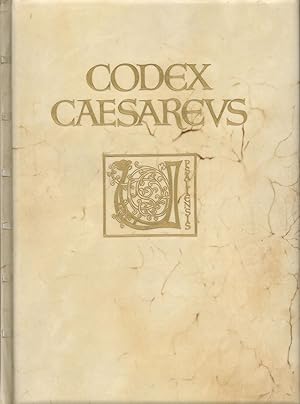
![Imagen del vendedor de Book of Kells: The Evangeliorum Quattuor Codex Cenannensis [3 Volume Set] a la venta por Besleys Books PBFA](https://pictures.abebooks.com/inventory/md/md31728655002.jpg)
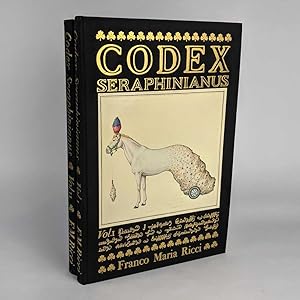
![Imagen del vendedor de P. Virgilii Maronis Bucolica Georgica et Aeneis / Ex Cod. Mediceo-Laurentiano descripta ab Antonio Ambrogi Florentino S.J.-- Tomus Primus (-- tertius) [FROM THE MEDICI'S VIRGIL CODEX IN THE LAURENTIAN, THIS TOP-END ZEMPEL SET WAS ONCE SHELVED AT THE ESCORIAL AND THE BRITISH MUSEUM OLD LIBRARY] a la venta por Arca Amoris Alitis](https://pictures.abebooks.com/inventory/md/md32008608554.jpg)


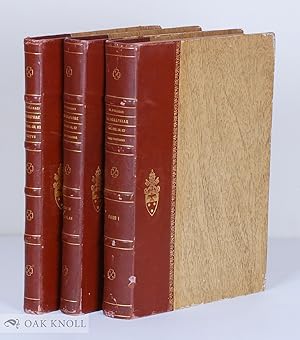

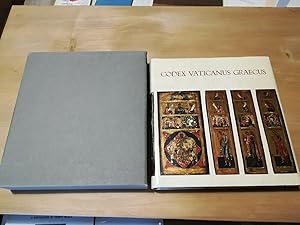


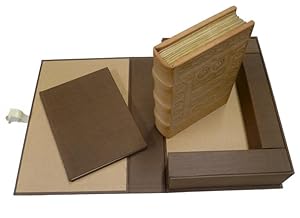

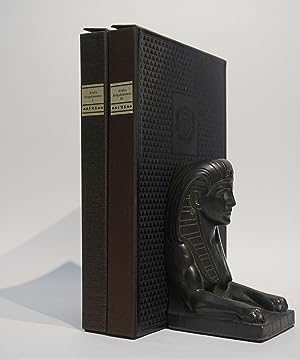
![Imagen del vendedor de [Codex Argenteus]: D. N. Jesu Christi SS. Evangelia Ab Ulfila Gothorum in Moesia Episcopo Circa Annum a Nato Christo Cclx. Ex Graeco Gothice Translata, Nunc Cum Parallelis Versionibus, Sveo-Gothica, Norraena, Seu Islandica, & Vulgata Latina Edita Glossarium Ulphila-Gothicum, Linguis Affinibus, Per Fr. Junium ; Nunc Etiam Sveo-Gothica Auctum & Illustratum Per G. Stiernhielm. a la venta por Leaf and Stone Books](https://pictures.abebooks.com/inventory/md/md32000391158.jpg)
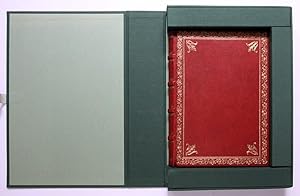


![Imagen del vendedor de [Codex Iustiniani]. Digestum vetus [-Infortiatum, -Digestum novum, -Institutionum, -Volumen locupletius, -Codicis.]. Commentarijs Accursij et clarissimorum iurisconsultorum scholijs [.]. a la venta por Gabriele Maspero Libri Antichi](https://pictures.abebooks.com/inventory/md/md30889242180.jpg)

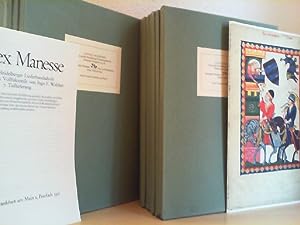

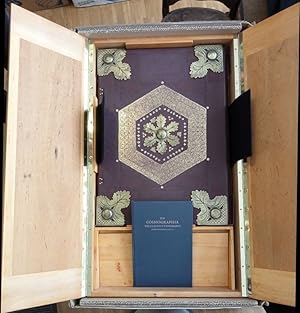

![Imagen del vendedor de Der Trojanische Krieg. Codex 2773 der Österreichischen Nationalbibliothek, Wien. 2 Bände [Faksimile- und Kommentarband, komplett] a la venta por Antiquariat Lenzen](https://pictures.abebooks.com/inventory/md/md31636447185.jpg)

